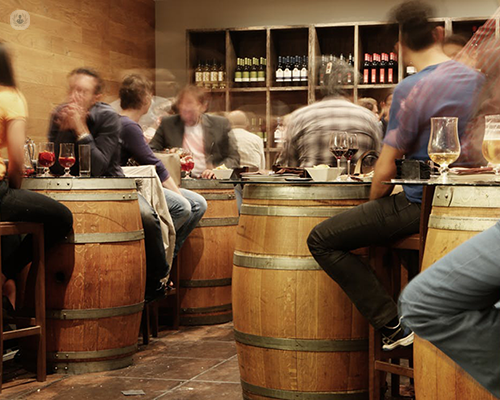When a pastime becomes a problem: 9 warning signs of alcoholism
Written by:An estimated 9 million people in the UK drink more alcohol than the daily recommendation. The effects of alcoholism can be devastating, both in terms of personal health and relationships. In many cases, it is a downward spiral. Alcoholism is a chronic and progressive condition; the longer it is left to follow its course, the harder it becomes to overcome the addiction. A burden on the health system, alcohol is responsible for roughly 10% of the UK’s annual deaths and diseases. Dealing with alcoholism can be a serious challenge not only for an alcoholic, but also for those around them. Here we take a look at 9 warning signs of alcoholism, and what to do if you suspect you, or someone you know, are at risk of becoming an alcoholic.

From pastime to problem: how to recognise alcoholism
Many of us enjoy a good drink every now and then, but when does drinking go from being a social pastime to a serious problem? In many cases, alcoholics remain in denial or do not even believe they have a problem. Alcoholism can affect relationships, work, and personal health. In fact, there are many conditions varying from throat cancer to liver disease that are linked to excessive alcohol consumption. Roughly 14 out of 100,000 people died of alcohol-related diseases in 2015 in the UK.
Here are some of the main warning signs of alcoholism to watch out for:
Drinking alone.
As drinking alcohol is usually a sociable activity partaken with friends or family, a classic sign that someone is at risk of becoming an alcoholic (or already is one) is that they no longer care if they drink with company. Once somebody starts drinking alone, it can be a slippery slope as each time this private habit may become more frequent bringing them closer and closer to chronic alcoholism.
Drinking to relieve stress.
After a hard day at work, every now and then the occasional glass of wine may not do any harm. However, if somebody is unable to deal with stressful situations without turning to alcohol, it could be a sign they need some help in dealing with possible alcoholism. Once it becomes a regular habit it could easily turn into alcohol addiction.
No limits.
Not knowing when to stop is also another warning sign of alcoholism. When a person decides to have a glass of wine or one beer but ends up finishing the bottle or all the beer in the house, even going out to buy more, it more often than not means they are in need of help.
Blackouts.
Drinking so much that they forget what they did is also a clear sign somebody could be an alcoholic. The question must be asked, why does a person have the need to drink so much that they cannot remember? This may also be a sign of another underlying condition, as it is a form of unhealthy escapism.
Planning life around alcohol.
If somebody’s drinking habit begins to interfere with their daily life, such as work or social engagements, it is another sign of alcoholism.
Hiding the habit.
Hiding alcohol around the house, or keeping one’s drinking habit a secret from those around them, is a sure sign of alcoholism.
Having to drink in order to be sociable.
Many people drink in order to boost their confidence at social occasions, but once it becomes impossible to socialise without drinking, this often signifies a dependency on alcohol.
Guilt.
Feeling guilty about one’s alcohol consumption can mean that the person is aware that they might have a problem and should seek help before things get out of hand.
Drinking alcohol to cure a hangover.
The hair of the dog may seem like a good idea to alleviate a hangover, but if it becomes a necessity after every time somebody drinks alcohol, it is another sure sign they are at risk of alcoholism.
There are many more symptoms of alcoholism, including physical dependence, abusing people when drunk, drinking and driving, inability to stop drinking alcohol, continued drinking even when it’s obviously causing harm to the affected and those around them, poor health, and many more.
Alcoholism tends to develop in stages, beginning with occasional abuse and binge drinking, alcohol consumption gradually increases and gets more and more out of control. Before they know it, any excuse will do to get drunk, including meeting up with friends, beating boredom, or overcoming sadness. The next stage is problem drinking, when a person continues with their habit regardless of the various problems it might cause. Eventually dependency and addiction takes over thus jeopardising their lives and the lives of those around them.
What to do when a habit becomes an addiction
If you or anybody you know are experiencing any of the alcoholism symptoms mentioned above, it is time to seek professional help. There are a number of helplines available to help people overcome their alcoholic affliction, including Alcoholics Anonymous, Alcohol Concern, Al-Anon Family Groups, and Rehab4Addiction.
The first step to treating alcoholism is often overcoming denial and accepting that there is a problem. After that, there are a number of ways to beat alcohol addiction, including counselling and therapy, certain medications, and detoxification. Nobody should have to be a slave to alcohol, that’s why it’s always best to get help sooner rather than later before alcoholism causes some serious harm. If you have any doubts, get in touch with a specialist.


